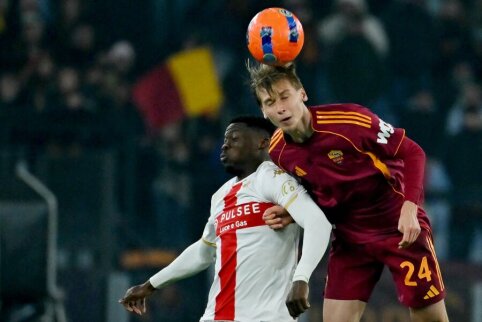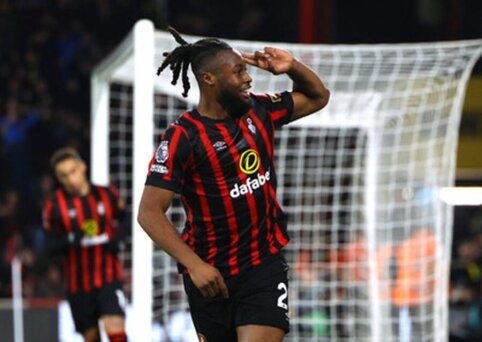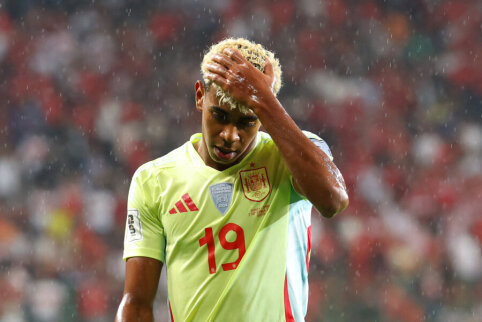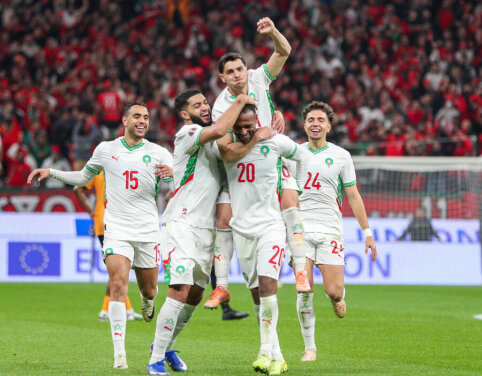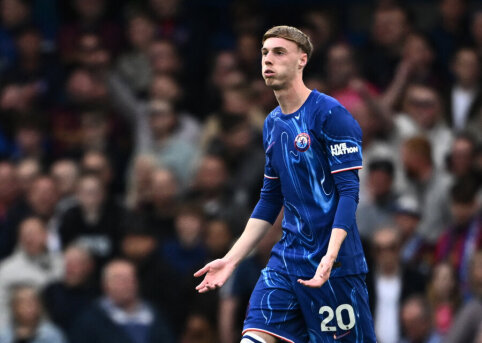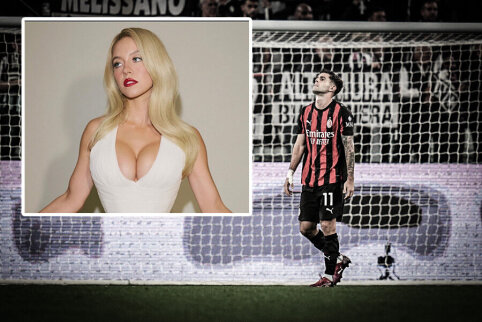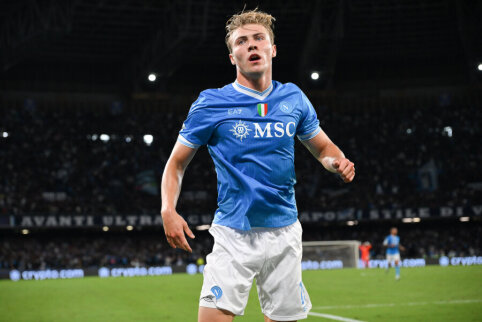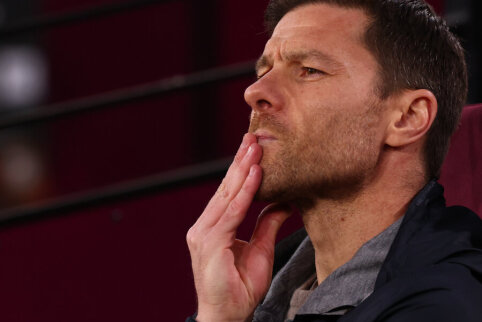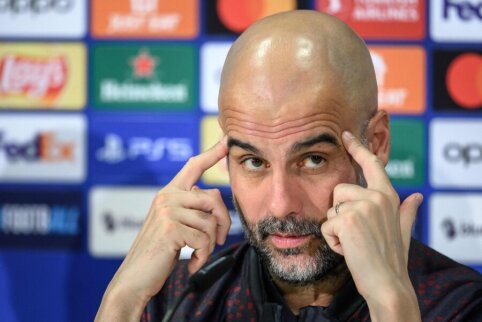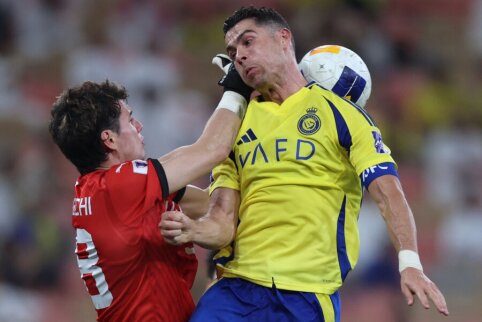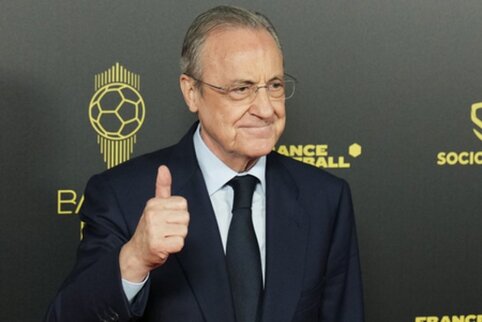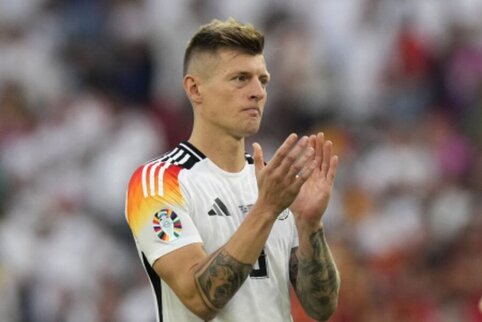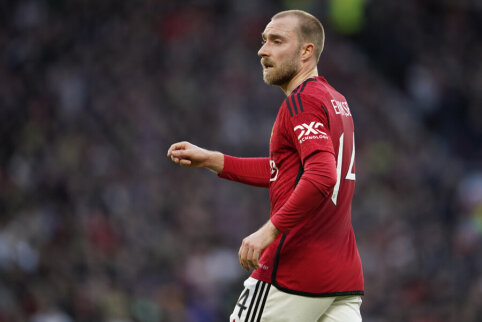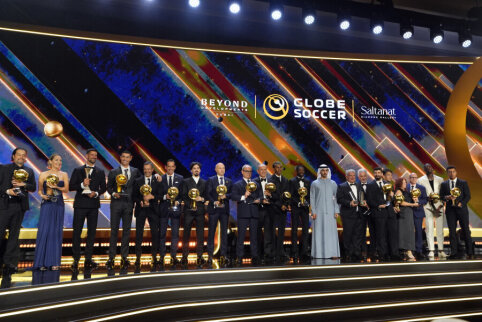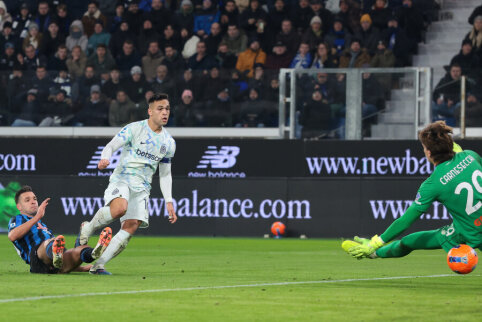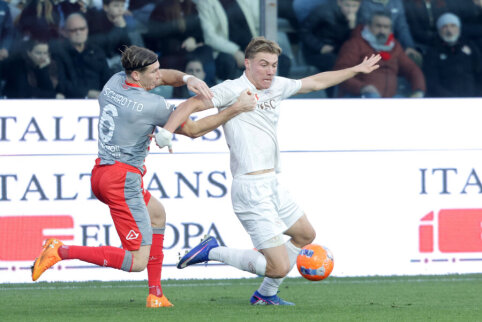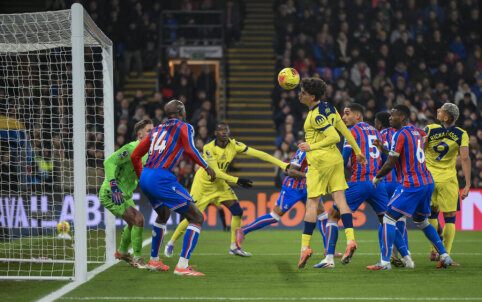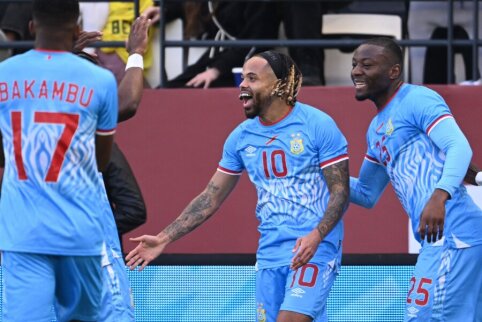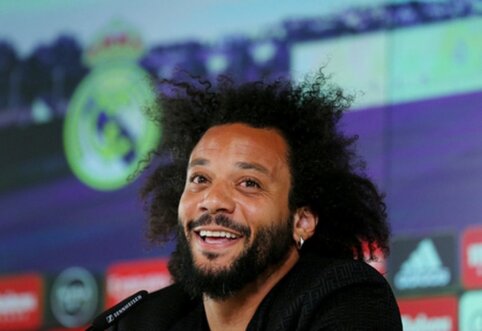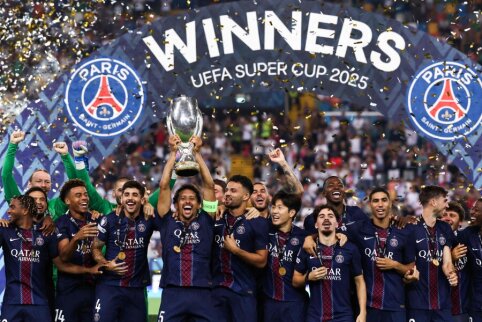 © EuroFootball.com
© EuroFootball.com
Short interview with Hernan Crespo you have already read, and now we offer to get to know the player more broadly.
Missed bus. Wheel of victories. Bitter departure. All these things give contours to Hernan Crespo's career. The Argentine national team and Milan Inter forward talked about all this to the Champions magazine correspondent.
The first years of 'Valdanito'
"I joined the first 'River' team when I was 18," H.Crespo recalls - "Daniel Passarella saw how I spoke, those hairs and everything else, and said that I was like a little Valdano. So the nickname 'Valdanito' stuck, although it was more for the media. If someone shouted Val-da-ni-to on the field, by the time they finished the ball would be somewhere else!"
Hernan Crespo looks completely at home, sipping coffee in the Adidas office and smiling at memories. It is said that in 2002, Jorge Valdano, who had taken such a position at Real Madrid that he could buy players, wanted to outbid Crespo. But political circumstances led to Ronaldo's arrival, and Crespo moved to the Inter club to take the Brazilian's place.
Why exactly Passarella compared Crespo to Valdano can be debated. But just before the 2006 World Cup, Valdano, who indirectly praised his compatriot, triumphed with Argentina in Mexico at the World Cup two decades ago: "I believe that it is time to stop calling Crespo 'Valdanito' and start calling me "Crespito."
"Perhaps we are physically similar," Valdano said, "but our style of play is different. Just look at the statistics and you can see that Hernan is more of a forward than I am. He is intelligent and determined, and he can better position himself to control the ball."
If Crespo were to teach the art of a forward, his thing would undoubtedly be movement without the ball, but he is also ruthless in finishing attacks in the penalty area. The rise of the 31-year-old player to one of the best strikers in the world (and the player who has been bought and sold for more than 100 million euros) was not very abrupt, but rather constant work until the last drop of sweat trying to earn a spot in the starting eleven at each club he played for.
Crespo began his professional career at River Plate. In 1993, when he and his classmates were preparing for the traditional end-of-school celebration - group holidays that take place in years when school is finished - Passarella invited him to join the main River team. He never finished his studies. Speaking about it, he seemed to express his dissatisfaction, as if he wished he had.
Gift of goals
Crespo was six when a friend suggested going to a "River Plate" trial. Although he stayed at the club until he was 21, it is often said that Crespo is a "San Lorenzo" fan. A few years ago, when asked which club he supports, he expressed a different opinion: "Well, you know, after 15 years spent at the club, when asked about it, I have to say that I am a 'River' fan." But isn't his father a 'San Lorenzo' fan? "He was," says H.Crespo. - Now he supports me!"
His romance with "River Plate" was interrupted when he moved to Europe, but the breakup was not bitter. His last match for the club was in 1996. After the match, many fans and team friends carried him around the pitch and performed a victory lap - the farewell was triumphant. Crespo scored both goals in the match against America de Cali and helped River win the Copa Libertadores.
As a transfer to "Parma" had already been agreed, Crespo knew that those important and emotional matches would be his last for the team. In 1994, he was a member of the River team that won the Argentine championship and did not experience defeat in any match.
"As a child, he stood out for his tall and slim build and intelligence in all matters. He had to pave his own way. It was clear that he had what it takes to be a top striker, but he had to watch matches from the bench. When the team was struggling, he would run onto the field and fix everything. Finally, established in the starting lineup, he rewarded us with goals - shooting with his right foot, left foot, head, knee, even thigh. He scored a jumping ball, over himself, hit it so hard that it was impossible to deflect, or cleverly turned the ball in," says Klaus Gallo, an Argentine historian living in England, who still follows Crespo's career as if the player were his son.
The first season at the "Parma" club was not easy for Crespo. He had to adapt to the professional life 'in exile,' learn a new language, and understand a new way of life. But Passarella, who was coaching the Argentine national team at the time, alleviated his worries a bit. He invited Crespo to the Olympic team, which won silver medals in Atlanta in 1996, and the striker, who scored 6 goals, was the top scorer of the tournament. He competed with Gabriel Batistuta for a place in the national team, but Passarella often chose Crespo and allowed him to play in the 1998 World Cup qualifiers.
Seasonal migrations
Since the beginning of the decade with the "Parma" team, H.Crespo managed to finish second in the Italian championship and win the Italian Cup and the UEFA Cup. The talented footballer caught the eye of Roma fans, and in the summer of 2000, the newly crowned Italian champions paid 60 million euros for the Argentine, a record sum at the time. The striker did not disappoint, and in his first season, he scored 26 goals and became the top scorer in Serie A, but his team struggled on the field and financially troubled Lazio was forced to sell their attacking leader to Milan Inter just before the start of the 2002/03 season.
In the latter club, which is ironic considering his most recent move, Crespo spent arguably the worst year of his career. Despite a successful start, later, for the player, as for many other Inter stars, failures began, and after suffering an injury, he played only 18 matches and scored 7 goals during the season. Although he embodies a player who lives for million-dollar deals with no loyalty or stability, Crespo himself does not think that way. Because of his failure at Inter, he left, as he assured, with tears in his eyes.
However, he came to Chelsea as a famous sniper. Over seven seasons in the Italian championship, he excelled 108 times, and he had to miss two World Cups in the shadow of Batistuta. He did not make a lot of fuss at Chelsea. At that time, highlighting the difference between the transfer fee and the player's contract terms ("When people talk about a million buy-out clause, they may not know that the vast majority does not go to the player's pocket"), he also admitted that part of him wanted to ignore the financial side of the deal.
"Part of you does not want to focus on it. It is true, there is also personal pride 'Oh! There is a person willing to pay that money just to call me to the team.' But that's it. No matter how much they pay you, your job remains the same. The moral responsibility is to give everything to the team that trusts you - to repay that trust," said the Argentine.
This moral responsibility partly explains Crespo's desire to return to Inter. "I cried when I left Appiano Gentile (Inter's training ground). I felt like I was leaving a big family and thought I wouldn't have that opportunity again," Crespo admitted. As he well knows, playing for Inter is not easy for forwards, but that is not important to the player. "The pressure never scared me. I always played with passion and gave it my all," insisted the Argentine. He demonstrated this on the field - ten H.Crespo goals helped Inter win the Italian Supercup, secure the top of the Serie A championship, and reach the Champions League knockout rounds and the Italian Cup semi-finals.
Crespo wanted to move to Milan, the city he calls home, where both his daughters were born, and where his wife's family lives, so after the 2005/06 season in London he packed his things as if he would never return. The day before leaving the English capital, he announced that he would keep his mobile phone on all summer, hoping to receive news from Chelsea that he was already free.
However, the chaos after the corruption scandal meant that no Italian club could pay the amount Chelsea wanted. Yet after difficult negotiations, Crespo agreed to significantly reduce his salary for the chance to return "home" on a two-year loan agreement. Due to his marriage to an Italian woman, he became an Italian citizen, so he does not take a foreign player slot in the Inter team. He expressed his gratitude to the Chelsea management for understanding his wishes. Although he is on loan at Inter, the Chelsea club saved millions by not paying him a salary.
Crespo did not settle in England. I met him in the spring of 2004, at the end of his first season at Chelsea, and saw him fitting his foot into a rubber mold so that Adidas representatives could measure the perfect size. With two employees crouched near his feet, he admitted that he had "never expected everything to be so difficult." His inability to speak English was the main problem, but not the only one.
He was often between the substitutes or ran onto the pitch, and he was particularly criticized for "not being able to joke with teammates in the dressing rooms, ask if he studied or was married, or read something good." It was also difficult for his partner to fit in. He went to Italy - he was loaned to Milan, where with his "Valdanito" smile he scored 10 goals in Serie A, six in 12 Champions League matches (including two in the final against Liverpool"), but the following year he was returned to Stamford Bridge.
The second time everything went better. The couple got married, they had a daughter, settled in the sparkling Slaunskver, and found new friends. It was also different at the Chelsea club, with less organizational mess. With horror, Crespo remembered his first season at the club, when after Champions League matches, they sometimes landed at the airport early in the morning and found neither the team bus, nor any explanation, nor any help. Although he appeared in the starting lineup less frequently than he would have liked, Crespo scored goals, and a third World Cup awaited him.
Discomfort and Joy
When the Argentine national team players left the Berlin stadium after losing to Germany in the quarterfinals on June 30, most of them were crestfallen and so shattered by defeat that they could hardly utter a word to the press. Some left the stadium quietly. However, one man stood above all - Crespo. Not because he is taller than most of his compatriots. He once joked that standing 185 centimeters tall felt like the father of other forwards: "Perhaps because I was much taller than them." Asked to compare all three coaches and three World Cups, Crespo was pragmatic: "They correspond to different periods of my life. With Passarella leading, Argentina was a counterattacking team - the goal was to take the ball and attack. Bielsa needed to always attack, and Pekerman is probably something in between - he based his game on attack but with more patience." The team found the needed balance sought by Argentina, restoring the reputation of the powerful football state. The results did not redeem the beautiful game on the field, but that's not always the case: "We managed to play good football. I think Pekerman's game concept is... like a dream," says Crespo.
As a player, he had a rare opportunity to look at football culture in Argentina, Italy, and England. He pinpointed the main difference without much thought: "In Argentine matches, people like a bit of fantasy, a trick here and there, and people are satisfied. In Italy, people like tactics and cleverness, good defense. In England, it's more instinct, more show, back and forth, boom boom..."
Saying those last words, Crespo slapped his fist into his palm, demonstrating kicking the ball back and forth. "Boom boom" is not a character from "The Lion King," it's just meaningless words he came up with trying to express the speed and theatricality of English football. "Regardless of whether the match ends 5-4, 3-4, or there are defensive errors... it's a show. The tornado of back and forth does not allow you to stop, think about what you are doing," he said.
Maradona, reminiscences, and glory
Hernan remembers when he was three and the family celebrated Argentina's victory in the 1978 World Cup. "My childhood memory is the whole family celebrating in front of the TV." He remembers seeing his father, who is usually very quiet, going crazy about Diego Maradona in 1986. "Diego is his favorite word to describe the World Cup." But Hernan's favorite player ("among people, as Diego is from another planet") is Enzo Francescoli. Speaking about him, Crespo says he was more fascinated by the former River Plate star when he met him "personally."
In Argentina, Crespo's name is so inseparably linked with the word "goal" that the Gillette product line for the World Cup was specifically designed around him. The company wanted to use the player's help in filming an advertisement, so a few years ago they flew a team of employees to the Chelsea training ground to shoot the ad.
Statisticians chose several Argentineans living in London. Before Crespo arrived for filming, there was concern about protecting him from curious autograph seekers. But over the course of hours, he relaxed and talked about football. His knowledge is comprehensive and encyclopedic. After all, one man dared to approach him, and they talked, hugged, and took a picture together.
As he headed back to Neasbridge, Crespo turned and asked, "Can I tell you what that guy told me?" The young man was a devoted River Plate fan. That night, when Crespo played his final match for the club, the boy was one of the spectators who ran onto the field, carrying him around the stadium.
"He remembers how I asked them to make sure we went around the whole stadium," Crespo marveled incredulously. "That's a beautiful story," I replied. "Beautiful?" Crespo briefly turned his gaze away from the road and looked at me, then continued: "All this makes the hair on the back of your neck stand up. He appeared clearly excited and surprised. "It is how we remain in people's memories," he muttered to himself. - It's insane."
